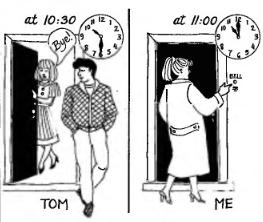Past perfect (I had done) в английском языке
 Study this example situation:
Study this example situation:

|
I went to a party last week. Tom went to the party too. Tom went home at 10:30. So, when I arrived at 11:00, Tom wasn't there. When I arrived at the party, Tom wasn't there. He had gone home. This is the past perfect (simple) tense: I/he/she (etc.) had (= I'd/he'd/she'd, etc.) gone I/he/she (etc.) hadn't gone had you/he/she (etc.) gone? |
We form the past perfect with had + the past participle (gone/opened/written, etc.). For irregular past participles see this.
Sometimes we talk about something that happened in the past:
- I arrived at the party.
We use the past perfect to say that something had already happened before this time:
- When I arrived at the party, Tom had already gone home.
There are some more examples:
- When I got home, I found that someone had broken into my apartment and had stolen my fur coat.
- George didn't want to come to the movies with us because he had already seen the film twice.
- It was my first time in an airplane. I was very nervous because I had never flown before.
 The past perfect (I had done) is the past of the present perfect (I have done). Compare these situations:
The past perfect (I had done) is the past of the present perfect (I have done). Compare these situations:
|
Present I'm not hungry. I've just had lunch. The house is dirty. We haven't cleaned it for weeks. |
Past I wasn't hungry. I'd just had lunch. The house was dirty. Wc hadn't cleaned it for weeks. |
 Compare the past perfect (I had done) and the simple past (I did):
Compare the past perfect (I had done) and the simple past (I did):
- "Was Tom there when you arrived?" "No, he had already gone home."
- Ann wasn't home when I called her. She was at work.
but: Ann had just gotten home when I called her. She had been at work.
but: "Was Tom there when you arrived?" "Yes, but he went home soon afterward."
For the past perfect continuous see this.